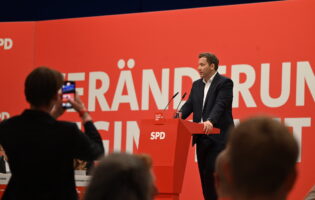Why Telling Japan’s Prime Minister to Stop Going to the Yasukuni Shrine is Not Enough
On March 6, the Obama administration sent a strong message to Japan and South Korea to work out their differences on historical problems. Speaking on Japanese television, U.S. Ambassador to Tokyo Caroline Kennedy said, “I’m sure President Obama will be very, very happy with the progress they will make.” The strong American reaction came in the wake of an official visit made by the Japanese Prime Minister, Shinzo Abe, to the controversial Yasukuni Shine, triggering condemnation from both Seoul and Beijing. After Abe’s December 26, 2013 visit, Kennedy released a public statement expressing “disappointment.”
While the Obama administration should be congratulated for taking notice of the long festering East Asian history issue, its “stop arguing and get on with it” approach seems to assume that historical tiffs in Asia are purely a local issue and that the United States bears no responsibility for unresolved problems stemming from the region’s complicated past.
In fact, Abe and many other nationalists who seek to negate the outcome of World War II are in office today because the United States pursued policies during the Cold War that encouraged the return to public office of officials who had played active roles in Japan’s expansion onto the Asian mainland.
Specifically with regard to the controversial Yasukuni Shrine, at first glance the problem of official visits by Japanese prime ministers seems to be connected to the secret enshrinement in 1978 of the souls of fourteen Class A war criminals, including Iwane Matsui, commander of Japanese forces in Nanking at the time of the 1937 massacre. Matsui was convicted of war crimes and executed in 1948 along with six other Class A war criminals. But Yasukuni would not be a controversial issue today had the United States chosen to object to the phoenix-like rise of this former center of Japan’s wartime emperor-centered cult to postwar prominence.
In defiance of Japan’s postwar constitution, which separates church and state, Yasukuni developed a close relationship with the Japanese government during the 1950s when Health and Welfare Ministry officials provided the records of Japanese soldiers and sailors killed in World War II. It should be remembered that in 1945 a mere 300,000 war dead had been consecrated; at present the shrine is home to 2.42 million, making Yasukuni the focal point of war memory for millions of Japanese families.
But it is not so much the enshrinement of the souls of Japan’s war dead that makes Yasukuni an object of foreign criticism. Rather, it is the view of history propagated at the Yushukan Museum attached to the shrine that has raised eyebrows. Through Yushukan, the shrine portrays Japan as a victim of Western imperialism and justifies Japanese military expansion on the Asian mainland as the liberation of Asians from that same yoke.
Incidentally, this view is shared by conservative nationalists, including to some degree by Abe himself.
The question that needs to be asked is why Abe thinks that he can count on the United States to look the other way while he makes an official visit to such a facility. The answer may be that Abe chooses to remember U.S. policies that Washington has chosen to forget. After all, Washington did not ask Abe’s grandfather, Nobusuke Kishi, any questions about his past as a wartime cabinet minister when the United States supported his candidacy for the premiership in 1957. Mr Kishi served as prime minister for three years in spite of having spent time in jail as a Class A war crimes suspect during the US-led postwar occupation of Japan.
Other Cold War U.S. policies might also encourage Abe to think that Japanese conservatives can count on support for a more assertive, nationalist Japan, especially at a time when China’s rise is seen as a threat to the stability of the region. For example, the lingering presence of tens of thousands of uncompensated forced laborers, including Korean and other Asian “comfort women,” is also in part the result of unwavering U.S. support for the Japanese government’s contention that all claims against Japan had been settled by the San Francisco Peace Treaty and subsequent international agreements. No U.S. government felt that it was in its interest to try to encourage Japanese political leaders to follow Germany’s example, which though also exempted from legal obligations to compensate victims of Nazi excesses, passed new legislation to permit restitution to be made to individual claimants.
The truly sad part of Japan’s history problem is that numerous public opinion polls have shown that the average Japanese believes that his or her country’s military expansion onto the Asian mainland was a mistake—that it brought terrible misfortune to Japan’s neighbors and that the Japanese state has not done enough to express remorse. In other words, laws enabling compensation to Chinese, Korean, and other survivors of forced labor would have reflected the will of the Japanese people.
All this leads one to ask whether Kennedy’s warning to Abe is a sign of a sea change in U.S.-Japan relations, heralding a desire on the part of U.S. leaders to take an active role to promote regional reconciliation, or if it is just a quick-fix strategy to get Japan and Korea to kiss and make up so as to strengthen a military alliance aimed at countering China’s projection of military power into the Pacific. If it is the former, then indeed this is a time for congratulations. If, on the other hand, this is just a short-term tactic, then we should all fasten our seat belts and get ready for turbulent times. The lesson Germany can teach East Asia is that to reap the rewards of reconciliation, every country has to deal with negative aspects of its past—Japan, Korea, China, and yes, even the United States.
Andrew Horvat is a veteran Tokyo-based writer and commentator. He has covered Japan, Korea, and China for the Associated Press, the Los Angeles Times, and the London Independent.









